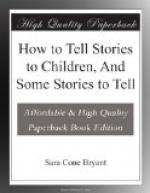Then the Piper’s mouth grew strange and thin, and sharp blue and green lights began dancing in his eyes, and he said to the Mayor very softly, “I know another tune than that I played; I play it to those who play me false.”
“Play what you please! You can’t frighten me! Do your worst!” said the Mayor, making himself big.
Then the Piper stood high up on the steps of the town hall, and put the pipe to his lips, and began to play a little tune. It was quite a different little tune, this time, very soft and sweet, and very, very strange. And before he had played three notes, you heard
a
rustling, that seemed like a bustling
Of merry crowds justling at
pitching and hustling;
Small feet were pattering,
wooden shoes clattering,
Little hands clapping and
little tongues chattering,
And like fowls in a farmyard
when barley is scattering,
Out came the children running.
All the little boys and girls,
With rosy cheeks and flaxen
curls,
And sparkling eyes and teeth
like pearls,
Tripping and skipping, ran
merrily after
The wonderful music with shouting
and laughter.
“Stop, stop!” cried the people. “He is taking our children! Stop him, Mr Mayor!”
“I will give you your money, I will!” cried the Mayor, and tried to run after the Piper.
But the very same music that made the children dance made the grown-up people stand stock-still; it was as if their feet had been tied to the ground; they could not move a muscle. There they stood and saw the Piper move slowly down the street, playing his little tune, with the children at his heels. On and on he went; on and on the children danced; till he came to the bank of the river.
“Oh, oh! He will drown our children in the river!” cried the people. But the Piper turned and went along by the bank, and all the children followed after. Up, and up, and up the hill they went, straight toward the mountain which is like the roof of a house. And just as they got to it, the mountain opened,—like two great doors, and the Piper went in through the opening, playing the little tune, and the children danced after him—and—just as they got through—the great doors slid together again and shut them all in! Every single one. No, there was one little lame child, who couldn’t keep up with the rest and didn’t get there in time. But none of his little companions ever came back any more, not one.
But years and years afterward, when the fat old rat who swam across the river was a grandfather, his children used to ask him, “What made you follow the music, Grandfather?” and he used to tell them, “My dears, when I heard that tune I thought I heard the moving aside of pickle-tub boards, and the leaving ajar of preserve cupboards, and I smelled the most delicious old cheese in the world, and I saw sugar barrels ahead of me; and then, just as a great yellow cheese seemed to be saying, ’Come, bore me’—I felt the river rolling o’er me!”




